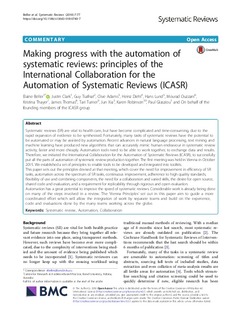Making progress with the automation of systematic reviews: principles of the International Collaboration for the Automation of Systematic Reviews (ICASR)
Beller, Elaine; Clark, Justin; Tsafnat, Guy; Adams, Clive; Diehl, Heinz; Lund, Hans; Ouzzani, Mourad; Thayer, Kristina; Thomas, James; Turner, Tari; Xia, Jun; Robinson, Karen; Glasziou, Paul
Journal article, Peer reviewed
Published version

Åpne
Permanent lenke
http://hdl.handle.net/11250/2585284Utgivelsesdato
2018Metadata
Vis full innførselSamlinger
- Import fra CRIStin [3604]
- Institutt for helse og funksjon [584]
Originalversjon
Beller, E., Clark, J., Tsafnat, G., Adams, C., Diehl, H., Lund, H., … Glasziou, P. (2018). Making progress with the automation of systematic reviews: principles of the International Collaboration for the Automation of Systematic Reviews (ICASR). Systematic Reviews, 7(1). 10.1186/s13643-018-0740-7Sammendrag
Systematic reviews (SR) are vital to health care, but have become complicated and time-consuming, due to the rapid expansion of evidence to be synthesised. Fortunately, many tasks of systematic reviews have the potential to be automated or may be assisted by automation. Recent advances in natural language processing, text mining and machine learning have produced new algorithms that can accurately mimic human endeavour in systematic review activity, faster and more cheaply. Automation tools need to be able to work together, to exchange data and results. Therefore, we initiated the International Collaboration for the Automation of Systematic Reviews (ICASR), to successfully put all the parts of automation of systematic review production together. The first meeting was held in Vienna in October 2015. We established a set of principles to enable tools to be developed and integrated into toolkits.
This paper sets out the principles devised at that meeting, which cover the need for improvement in efficiency of SR tasks, automation across the spectrum of SR tasks, continuous improvement, adherence to high quality standards, flexibility of use and combining components, the need for a collaboration and varied skills, the desire for open source, shared code and evaluation, and a requirement for replicability through rigorous and open evaluation.
Automation has a great potential to improve the speed of systematic reviews. Considerable work is already being done on many of the steps involved in a review. The ‘Vienna Principles’ set out in this paper aim to guide a more coordinated effort which will allow the integration of work by separate teams and build on the experience, code and evaluations done by the many teams working across the globe.
